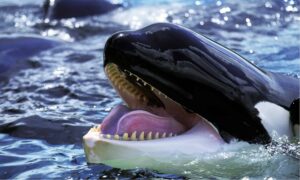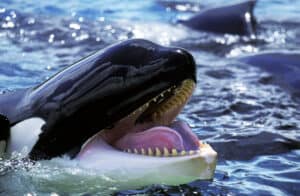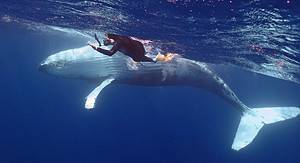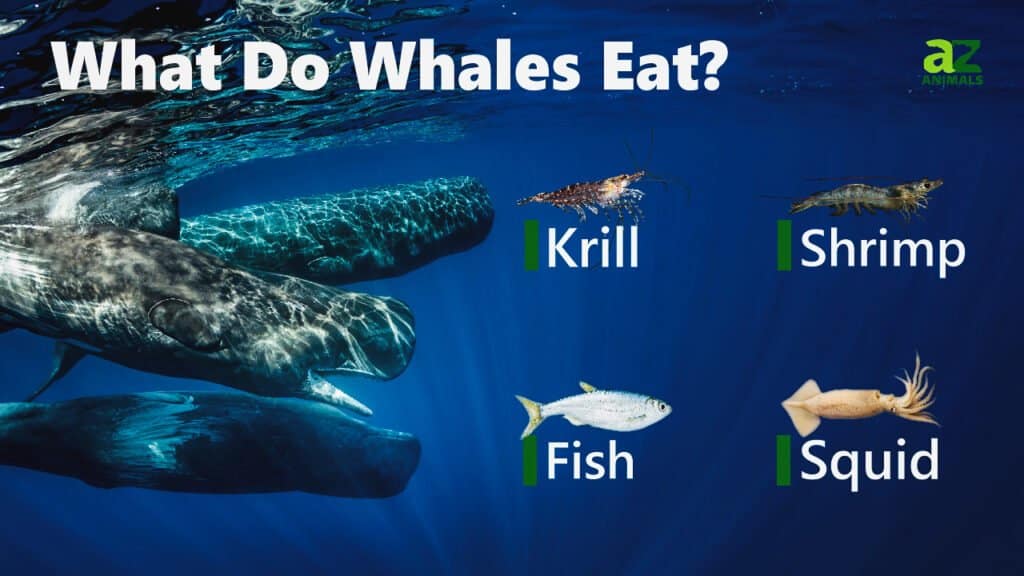
Whales are some of the largest animals on Earth. They are classified as cetaceans, a group of marine mammals that includes about 90 unique species of whales, dolphins, and porpoises. All species of whales can be divided into two main groups, baleen whales and toothed whales, depending on whether they have teeth or baleen plates in their mouths. Let’s dive into what whales eat!
What Do Whales Eat? It Depends on the Type!
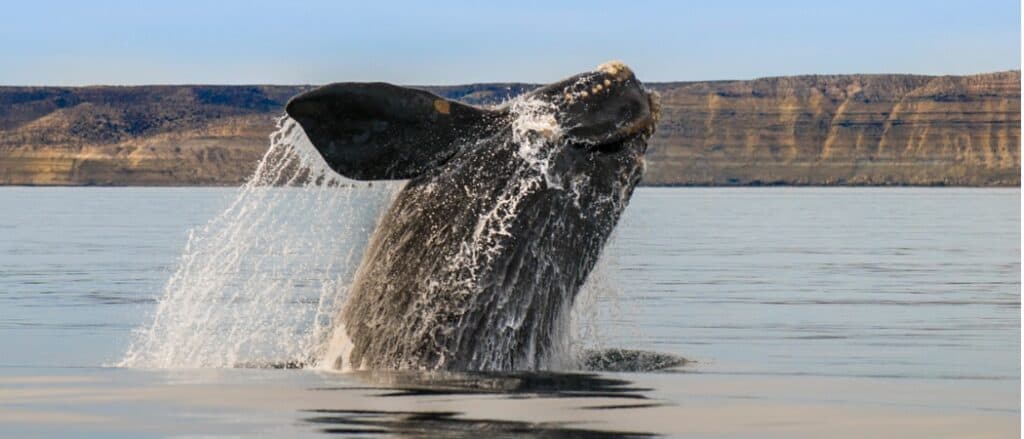
Southern right whale coming out of water.
©Foto 4440/Shutterstock.com
As you might imagine, these massive animals have large diets, and they consume a variety of different foods in the ocean to give themselves enough energy to find mates and reproduce. So, the answer to the question “what do whales eat” depends on the type of whale. once again, the two main types of whales are:
- Baleen whales
- Toothed whales
Whales eat krill, shrimp, zooplankton, phytoplankton, algae, squid, octopuses, sharks, and much more. Yet, many of the largest whales in the world are happiest to simply eat lots of the smallest creatures in the ocean while smaller whales will actively hunt for sharks and marine mammals. Let’s dig deeper into what whales eat by breaking them down into baleen whales and toothed whales.
How Do Baleen Whales Eat?
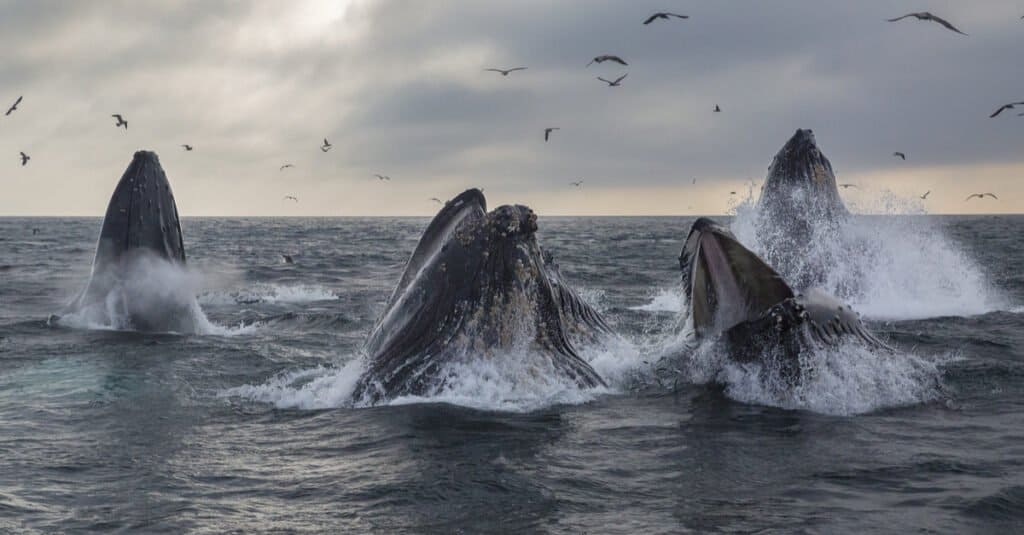
A pod of humpbacks lunge feeding off California
©Chase Dekker/Shutterstock.com
Baleen whales, also known collectively as Mysticeti, are one of the two main groups of whale species. There are 16 unique species of baleen whales, many of which are some of the largest animals on the planet, such as the blue whale and the humpback whale.
Baleen whales get their name from the unique structure in their mouths, the baleen plate, which they use as a filter to pull food out of the water in a process known as filter feeding.
Baleen plates are attached to the inside of a baleen whale’s jaw and hang from the gum line in the place of teeth. These plates have thousands of long, thin bristles, known as baleen hairs or whalebone hairs. These bristles are strong yet flexible. Although they look like long, thin teeth, baleen hairs are actually made of keratin, the same material that makes up human hair, skin, and fingernails!
The main way baleen whales filter feed is by straining large amounts of water into their mouths, in the process also trapping lots of tiny crustaceans, plankton, and other tiny fish in their baleen hairs. They then lick the fish off of their baleen with their tongues and swallow them.
The Three Types of Filter Feeding
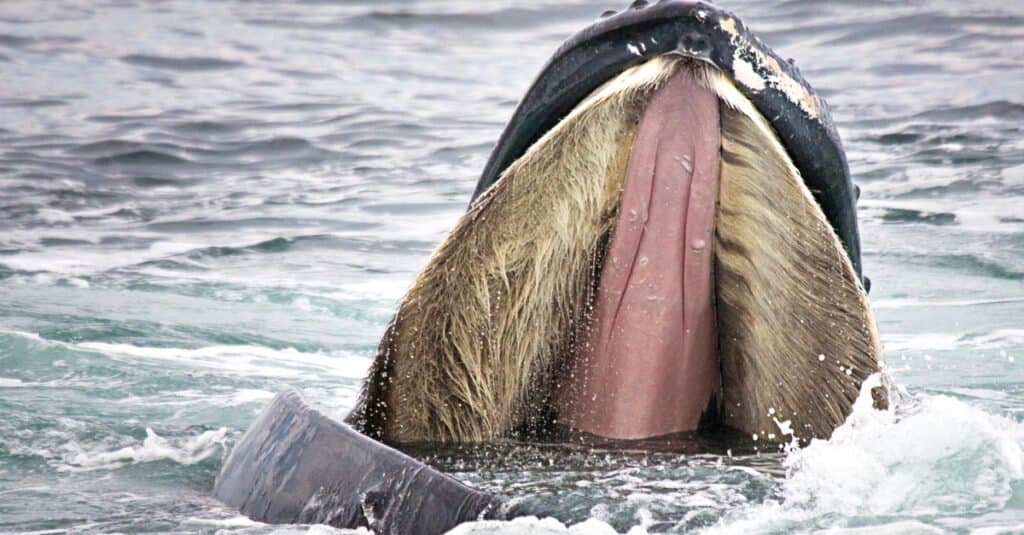
A closer look at baleen inside a whale’s mouth
©John Tunney/Shutterstock.com
There are three slightly different types of filter feeding utilized by various species of baleen whales: lunge feeding, skim feeding, and bottom feeding.
Lunge feeders, like blue and humpback whales, are the most common, and they essentially swim quickly through the water to gain momentum before lunging at a large group of fish with their mouths open. After engulfing as much water and fish as it can, a lunge feeder will use its tongue and throat to push the water out through the tiny spaces between its baleen hairs. It will then swallow the leftover fish trapped between its baleen hairs and in its mouth.
Skim feeders, such as bowhead whales, will swim much more slowly through the water towards groups of fish, pulling them and large amounts of water into a gap in the front of their baleen plates very gradually. After pushing the water out of its mouth, a skim feeder then eats the leftover fish and other animals stuck to its baleen hairs.
As their name suggests, skim feeders generally prefer skimming the ocean surface, though skim feeding is actually possible at any depth, even at the bottom of the ocean.
Finally, bottom feeders like gray whales lurk near the bottom of the sea, swimming on their sides along the ocean floor and slowly pulling water as well as lots of tiny crustaceans and fish through their baleen plates. They feed similarly to skim feeders and leave long trails of mud along the ocean floor from where their bodies drag along the surface.
What Do Baleen Whales Eat?
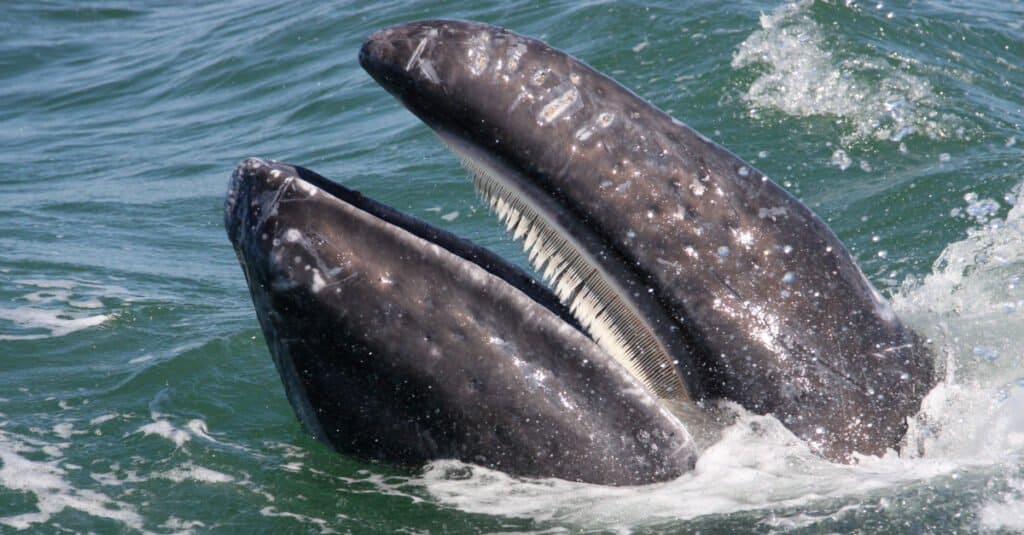
A gray whale shows off its baleen.
©jo Crebbin/Shutterstock.com
Although the many types of baleen whales eat in slightly different ways, their diets are all very similar. Since the spaces between their baleen hairs are so narrow, they tend to pull very small prey into their mouths in huge amounts. The main types of food they eat are:
- Krill
- Shrimp
- Copepod crustaceans like water fleas
- Schools of small fish like anchovies and herring
- Zooplankton
- Phytoplankton
- Algae
How Do Toothed Whales Eat?
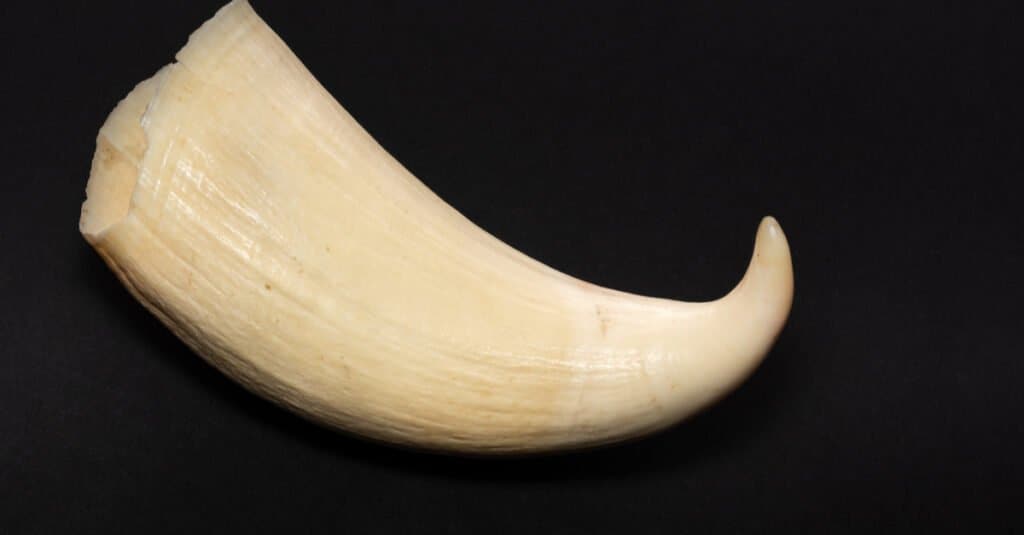
The tooth of a
sperm whale
.
©Steven Giles/Shutterstock.com
Toothed whales, such as the killer whale and sperm whale, make up the other main group of whale species. There are 73 different species of toothed whales, known formally as Odontocetes, and they tend to be much smaller and more agile than most species of baleen whales. Toothed whales are named such for their sharp, cone-shaped teeth they use to capture and tear apart prey.
These whales eat in a much more straightforward manner, simply stalking their prey and lunging at them when they get close. They pull the prey animal, usually some type of fish or squid, into their mouths and will sometimes even swallow them whole.
A 2017 study found that the size of a toothed whale’s prey depends largely on the whale’s skull size!
By using 3D imaging to closely compare various species of toothed whales’ craniums to their prey size, researchers found there is a strong link between the two. In short, whales with larger skulls tend to consume larger prey, while whales with smaller or more elongated, narrow skulls tend to feed on smaller animals.
What Do Toothed Whales Eat?
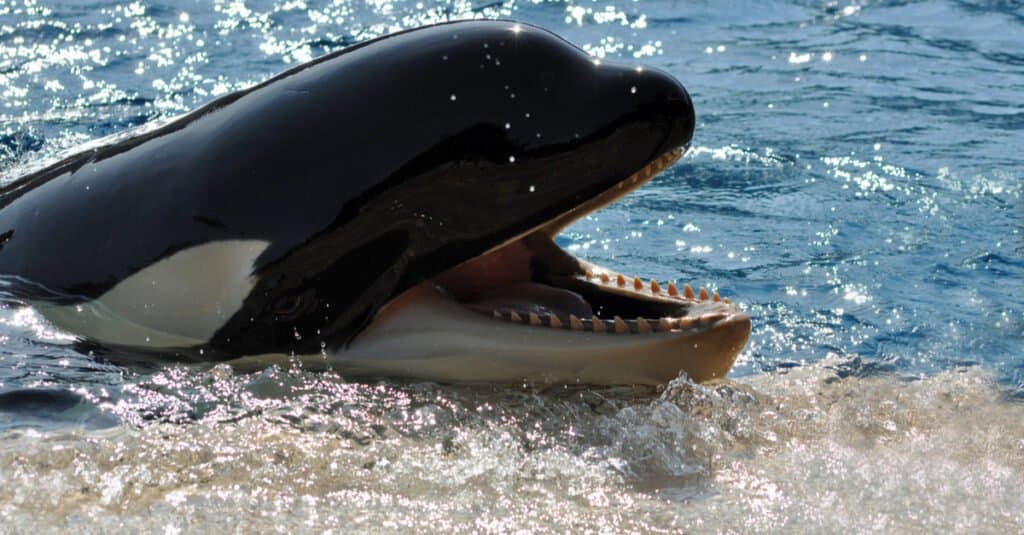
A killer whale shows off its teeth.
©Heather Renee/Shutterstock.com
Toothed whales prefer larger prey than their baleen cousins, and their bodies and teeth are much better equipped for quickly and efficiently taking down larger prey animals. They aren’t picky eaters and will commonly feed upon a wide range of different marine animals, such as:
- Squid
- Octopus
- Crustaceans of varying sizes, from shrimp and krill to crabs and lobsters
- Various types of small and large fish, such as halibut, herring, smelt, and mackerel, depending on their location
- Seals
- Sea birds
- Sharks and rays
- Walruses
In some cases, certain toothed whales such as killer whales will even eat other whales and cetaceans like dolphins and porpoises!
The photo featured at the top of this post is © Chase Dekker/Shutterstock.com
Thank you for reading! Have some feedback for us? Contact the AZ Animals editorial team.



